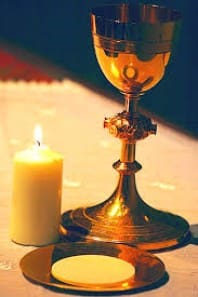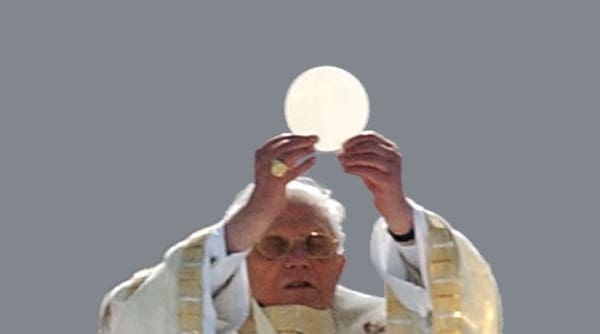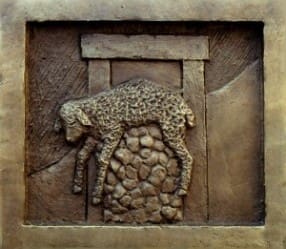Corpus Christi Sunday:
A Symbolic Solemnity?
I wanted to share with you a conversation I found myself in a few weeks ago.* I found it relevant as these are the days we are reflecting into Corpus Christi.
Friend: “What gives you reason to believe the Eucharist is more than a symbol?”
Me: “What gives me reason to believe that it is not?”
Friend: “Because, nowhere in Sacred Scripture does Jesus Christ say that ‘I am the Eucharist.’”
Me: “Would you like to read John 6 with me?”
Friend: “No.”
Me: “Why not?”
Friend: “Because, I know Scripture, and he does not say: ‘I am the Eucharist.’”
Me: “Do you know what the word Eucharist means?”
Friend: “Does it matter?”
Me: “Only if you want your original question answered…as it relates to the Eucharist being a symbol or not.”
Friend: “Humor me.”
Me: “Thanksgiving”
Friend: “Where is that in the gospel?”
Me: “Can we read John 6 now (taking mental note at this point to be sure to go to 1 Corinthians 11 after we go through John 6)?”
Friend: “Sure.”
So it is, we carefully went through John 6, taking note of our Lord “giving thanks”, and its Greek eucharisteo (where we get the word Eucharist). As we were going through the “Bread of Life discourse” (John 6), my friend’s interest started to peak with Christ’s emphasis on the need to “eat” this bread come down from heaven. The conversation continued:
Me: “Take note of the evolution of our Lord’s language. John wants us to see something here.”
Friend: “What do you mean?”
Me: “Up to verse 54, John employed the Greek esthio, which is the more common Greek for eating. In verse 54, he uses the term trogo, which literally means “to chew, or gnaw”; Specifically, to chew or gnaw on animal stock such as mules, pigs, cattle, and so on. Recall that John has already set up his gospel to focus in on Christ as ‘the lamb of God’ (John 1:36). Strategically, John wants us to see that Christ is the new Passover lamb that we are to literally consume so as to be in covenant communion with Him.”
Friend: (with a growing curiosity) “Are you suggesting that Christ is establishing Himself as the one and final Passover sacrifice?”
Me: “No, Christ is!”
Pause, and then it happened with the simple request to read John 6:60.
Friend reading John 6:60-66:
“60 Many of his disciples, when they heard it, said, ‘This is a hard saying; who can listen to it?’ 61 But Jesus, knowing in himself that his disciples murmured at it, said to them, ‘Do you take offense at this? 62 Then what if you were to see the Son of man ascending where he was before? 63 It is the spirit that gives life, the flesh is of no avail; the words that I have spoken to you are spirit and life. 64 But there are some of you that do not believe.’ For Jesus knew from the first who those were that did not believe, and who it was that would betray him. 65 And he said, ‘This is why I told you that no one can come to me unless it is granted him by the Father.’ 66 After this many of his disciples drew back and no longer went about with him.”
Friend (with a sigh): “I suppose I have a rhetorical question. Why would they leave if it was just a symbol?”
Me: “Exactly. Consider, these are the same men that stood by and watched his mighty works, and yet they abandon their master for the sake of something merely symbolic? By your facial expression, I am concluding that, at the very least, you see this as illogical.”
Friend: “Yes, and if I am going to be honest, that simply does not add up.”
Me: “Can I show you something else?”
Friend: “I feel like I need to sit on this for awhile, but go ahead, fire away.”
Me: “It is the passage concerning the only time Paul directly quotes Christ.”
Friend: (with a smile) “More symbol verses reality?”
Me (laughter): “I suppose, yes. The passage is 1 Corinthians 11:23-26.”
Friend: “Can I read?”
At this point, I am taking note that just five minutes ago he had no desire to read what he supposedly already knew, and now he wants to read (this is not uncommon).
Me: ‘Please!”
Friend (reading the passage):
23 For I received from the Lord what I also delivered to you, that the Lord Jesus on the night when he was betrayed took bread, 24 and when he had given thanks, he broke it, and said, “This is my body which is for you. Do this in remembrance of me.” 25 In the same way also the cup, after supper, saying, “This cup is the new covenant in my blood. Do this, as often as you drink it, in remembrance of me.” 26 For as often as you eat this bread and drink the cup, you proclaim the Lord’s death until he comes.
Me: “What do you see in this passage?”
Friend: “A command: ‘do this’, and to be honest with you, I am still taken back that these are the only words that Paul chooses to directly quote Christ. I suppose that alone should have us rethinking the importance of these words.”
Me: “Yes…Paul knows the importance of this passage, this is why he goes back to the events in the upper room, because in the words, ‘this is…the new covenant in my blood’, he is in fact saying: “my flesh, my blood: this is the New Testament! This is why I came!”
And, after reminding my good friend that it is not so much about where the New Testament is in the Mass, but in light of Christ’s words, the Mass is the New Testament, I continued:
“…John 6 is the backdrop to this passage (along with Mark 14: 24), because once we understand that the Eucharist is Christ’s very flesh, we are then made to ask the question: “How does this take place?’ And for the sake of time, let’s just say (quoting my old Professor, Dr. Hahn), ‘If the Mass is just another symbolic meal, then Christ’s death was just another execution.”
Friend: “So Christ’s sacrifice is inseparable from the Eucharist?
Me: “Amen! Exactly, and when we have more time, we would be well served to take up the Letter to the Hebrews on this matter.”
Friend: “Why are not more people aware of these passages?”
Me: “This is a question, for everyone who knows such passages, to take up personally. In other words, as I have been made aware of them, I can never share them enough. I suppose I am challenging myself to ‘go forth’, and proclaim these verses more. Pray for me.”
Friend: “In saying that, let us pray.”
Me: “Ok, before we do, can I ask you one more thing?”
Friend: “Yes, please.”
Me: “Can I leave you with a homework assignment?”
Friend (with laughter): “Once a teacher, always a teacher…yes.”
Me: “Can you reflect into why the Eucharist is not a symbol, but a living reality as it relates to our personal relationship with our Lord Jesus Christ.”
Friend: “Hmmm…now you are talking my language—Yes!!!”
Me: “Well…it is the first language of God: that is intimate communion.”
Friend: “Yes, I am beginning to see that.”
“Our Father…”
+
Art: First two photographs courtesy Dr. Joseph Hollcraft, used with permission. Detail from Canonization ceremony of Brazilian Friar Frei Galvão celebrated by Pope Benedict XVI at the Campo de Marte, in Sao Paulo, Brazil, Fabio Pozzebom/ABr, 11 May 2007, CCA 3.0 Brazil, Wikimedia Commons.
* This post was originally published on Dr. Hollcraft’s blog and used with permission. A version of it can also be found in his book A Heart for Evangelizing, published by Emmaus Press.






